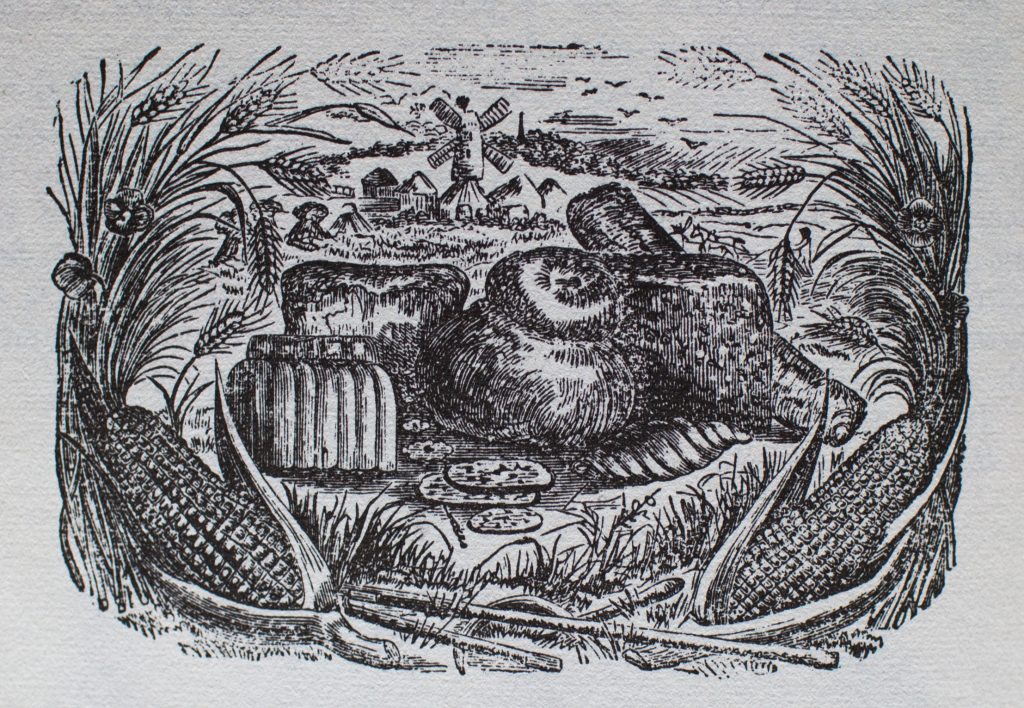
An interesting letter has come to light among the Poor Law records and receipts being examined by the East Sussex project, Small Bills and Petty Finance 1700-1834; it is dated 12 October 1834 and is directed to the members of the East Hoathly Parish Council.[1] The letter is from one Richard Gardiner, who will be absent from the autumnal Vestry Meeting, but who wishes to communicate to the Council strong feelings about the market price of wheat and the consequent price of flour, which he can prove is unfairly set in favour of the producers and to the detriment of the consumers; consumers in this rural village being mainly agricultural labourers and the Gentlemen addressed, mainly their employers, the farmers.
These Gentlemen may be his friends and colleagues, but nevertheless, Mr Gardiner states his arguments very firmly, beginning by demanding that at the very least in these difficult circumstances, the workers should suffer no pay cut:
I appeal to such of you – Gentlemen as are Growers, whether, under the depressed and as may be apprehended – the declining State of the Corn Markets, the present general Rate of two Shillings daily Wages, can, without Disadvantage to yourselves be continued to the agricultural Labourer, . . .
This against a back story when for decades the English countryside had known only poor harvests, bad winters and foreign wars. The lawmakers had unashamedly drafted the laws and passed the Acts that ensured the comforts of their own class, while the poor became poorer they suffered under the Enclosures (measures to facilitate new farming methods by consolidating holdings, but cruelly implemented, eradicating the old peasant class), the Corn Laws (measures that protected the farmers from bad harvests and cheap imports but caused a rise in the price of bread), and the Game Act (vicious anti-poaching law: no feeding the family with a rabbit for the pot; 7 years transportation for owning a trapping net, while Man Traps were lawful until 1831). In this way the labouring classes were impoverished, stripped of hope and criminalised.
However, the main impact of the letter concerns the Millers’ excessive prices for flour, a problem which is presented in tabulated detail. And even more seriously, Mr Gardiner writes,
I am credibly informed – that at Lewes, Hailsham, and the other Corn Markets, it is normal with the Millers who meet there to fix by their own Law of Assize, the Price of Flour for the ensuing Week. This, in itself illegal, is in Reality a Conspiracy against the Consumers, which they are unquestionably warranted to counterattack by such Measures as they may think most conducible sic to a Supply of Flour proportioned to the actual Average Price of Wheat . .
Having clearly stated the case, the letter concludes:
In common Candor sic and Justice to Mr John Marten, to the Sons of the late Mr Holman and many others of the Trade who may be in the Habit of supplying Flour to the Inhabitants of East Hothly sic you will, I feel confident, coincide with me in the Propriety of communicating to them whatever may be the Result of your Consultations on this Subject and you will I am equally confident, allow them a reasonable Time to consult with each other – with their Friends, and maturely to determine on their Answer – whether to reject – or satisfactorily, by Explanation, or otherwise – to meet – the Inquiry, which you may think proper to make and continue making – with a View to establishing a more equal…sic than the present Charge for Flour, when compared with the Market Price of Wheat –
I am,
Gentlemen,
Your obedient Servant
Richard Gardiner
P.S. The penny – to the £1 – I consider a most unfavorable sic Scale to the Consumer –. .
It is good to know that East Hoathly had one voice in support of the disadvantaged classes; that it is a calm, measured and reasonable voice ensures that it is particularly persuasive.
[1] ESRO: PAR378/31/3/ (to be confirmed)
Written and transcibed by Anne White